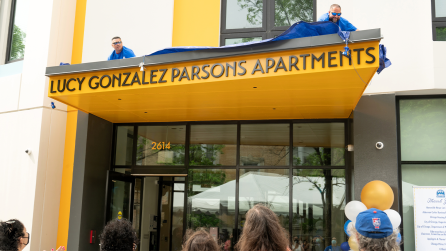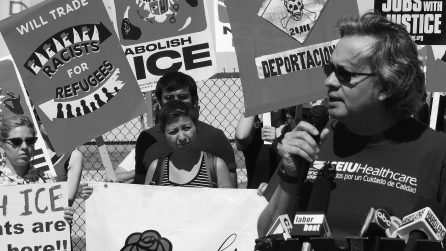Billionaires and Buy Offs
As St. Louis struggles to achieve fiscal solvency, a local billionaire and his enablers are trying to snatch what remains of our assets.
Eyes tend to glaze over when people use the word “neoliberalism,” but examples abound, especially during times of acute economic crisis—”disaster capitalism,” as Naomi Klein and others have described the phenomenon. A few years ago, former mayor Francis Slay floated a plan to privatize St. Louis’s excellent public water supply, but citizens shut him down. These grassroots activists and volunteers were able to stop the sale of this public asset to the company that took over water operations in Flint, Michigan, the source of an ongoing public-health disaster.
But before Slay left office, he left his preferred successor, current mayor Lyda Krewson, with a hot potato: an ongoing, expensive study to privatize St. Louis Lambert International Airport. This scheme to privatize St. Louis’s only major airport has been funded almost exclusively by local billionaire Rex Sinquefield, who assembled a panel of “experts” who won’t get paid unless it goes through—an obvious conflict of interest.
There is a reason that the U.S. has no privatized airports, except in the commonwealth of Puerto Rico. Privatizing a public good, whether it’s the community water supply or an airport, is a failed strategy.
Privatization and Its Discontents
If you believe all the billionaire-generated propaganda, you might suppose that Sinquefield’s privatization proposal makes sense financially. After all, our mayor holds an advanced degree in accounting, as she’s fond of reminding us. But then why did every independent analyst who doesn’t stand to profit from the deal call it an inadvisable risk? If it’s such a great idea, why isn’t it happening everywhere, and why wasn’t it a miracle for Puerto Rico?
More urgently, why should we trust the recommendations of experts who won’t get paid unless the deal goes through? If it’s possible to extract so much surplus value from a public good, why can’t we do it ourselves and reap the certain rewards? Why should a radically right-wing libertarian billionaire and his cronies enrich themselves at the taxpayers’ expense? Why should we allow Grow Missouri, the Koch Brothers, Americans for Prosperity, and their ilk to set the agenda when control of a public asset is at stake?
One multinational corporation that’s jockeying for a place at the public trough is the Spanish firm Ferrovial. Guess who works as a lawyer and lobbyist for Ferrovial? That’s right: Slay, longtime mayor and loyal ally of Krewson, the current mayor. Both have received hefty donations from Sinquefield and his proxies.
Other actors driving the privatization agenda include, at least indirectly, the Trump administration and its aggressively pro-corporation Federal Aviation Administration. As longtime St. Louis Not For Sale (STLNFS) volunteer Glenn Burleigh explains, “The benefits of privatization accrue to the company awarded the contracts, not the residents who get stuck with higher costs. The airport is the current front of struggle, but recurring local media chatter about privatizing the city’s water supply and refuse service indicates that there will likely be more fronts opening up in the not too distant future.”
Fighting Back
STLNFS is an all-volunteer group of city residents who oppose plans to privatize the airport, refuse department, water supply, and all other important city services and assets. This coalition of volunteers includes members of local policy activist groups and political organizations, including St. Louis Democratic Socialists of America (STLDSA). Approximately half of the most active members of STLNFS are members of STLDSA. In fact, STLDSA was the first group to endorse STLNFS when it launched this summer, and we’ll be working to recruit DSA members to help collect signatures at the polls on March 5.
Where Does the Airport Deal Stand Now?
Last August, the Sinquefield-subsidized consultants announced an 18-month timeline. A “working group” devoted to privatization meets regularly, safe from public scrutiny. Ensuring that the privatization scheme goes through is the primary—and possibly sole—objective. But nobody gets paid if the deal doesn’t happen, and costly consultants don’t work for free.
STLNFS volunteers continue to collect signatures to put an ordinance on the ballot in November. If passed, it will require a public vote to approve any contract offered to private operators. Ald. Cara Spencer, with the support of many of her colleagues on the Board of Aldermen, also introduced Board Bill 93, which would mandate a public vote before airport operations could be privatized. Unfortunately, after being assigned to the Transportation and Commerce committee by Ald. Marlene Davis, who supports privatization, it was voted down in January, when Ald. John Collins-Muhammad, a co-sponsor of Spencer’s bill, capriciously flipped his vote.
Spencer is up for re-election in March, and the fate of the board bill that she sponsored is uncertain. “If I’m reelected, I absolutely will introduce this bill again,” she told a Riverfront Times reporter the day her bill narrowly failed. “This is the single biggest asset the city has. You’re damn right we’re going to make sure a vote happens.”
Spencer’s opponent, Sunni Hutton, has also signed the STLNFS pledge to oppose airport privatization efforts. However, if STLNFS gathers the necessary number of valid signatures, the matter will bypass the Board of Aldermen entirely and go on the ballot for voters to decide—which Sinquefield and his supporters strongly oppose. But even if voters reject a plan to lease or sell off the airport and its management to a private entity, the GOP supermajority in the Missouri legislature could override them, as it did when voters recently enacted legislation to improve puppy-mill oversight, and as it may be doing right now with the recently passed CLEAN legislation for electoral reform.
In the upcoming elections, St. Louis voters could change the dynamic of the airport negotiations. In the March primary race for president of the Board of Aldermen, both of the major challengers—Democrats Ald. Megan Ellyia Green and State Sen. Jamilah Nasheed—have signed the STLNFS anti-privatization pledge. (The Democratic incumbent, President Lewis Reed, has yet to sign it.) Green, a member of St. Louis DSA who has been endorsed by both the local chapter and national organization in the race, has been a stalwart proponent of the public vote and privatization skeptic since the scheme first bubbled up early last year. Nasheed initially came out in favor of a public vote only, but the continuing escalation and pressure of the Not for Sale campaign succeeded in advancing the narrative that municipal asset sell-offs are incompatible with progressive politics, and she too signed the pledge in late January.
Opponents of privatization are wary because, in some cases, candidates might equivocate by promising not to sell the airport while simultaneously pursuing deals to lease it, which is unlikely to benefit anyone except the investors (and their highly paid consultants and lobbyists). But a long-term lease of the airport to a private entity is privatization, even if the airport isn’t technically sold.
The future control of Lambert International Airport will have consequences far beyond St. Louis and its local government. “The Koch Bros. and hedge funds from across the planet are watching the process,” Burleigh notes in an e-mail. “A hedge fund employee, whose firm was in town to review ways to get involved in the bidding process, flat-out said that they were looking at St. Louis’s process as something that would be exported to cities across the country, if [privatization efforts] are successful. Forcing the question onto the ballot and stopping the privatization of our airport will send a message to finance capital that future attempts to privatize other airports will also be hard fought.”




